| "I think Putin, one of his many, huge miscalculations in invading Ukraine is he has dramatically changed the geostrategic posture of Western Europe." - Former U.S. Secretary of Defense Robert Gates on how Russia's invasion of Ukraine is reshaping European alliances. Welcome to the "Face the Nation" Five at Five newsletter. Scroll down for your five takeaways from today's broadcast of "Face the Nation with Margaret Brennan" on CBS. Did someone forward you this? Sign-up at cbsnews.com/email. 1. Robert Gates: Sweden and Finland joining NATO is "huge" 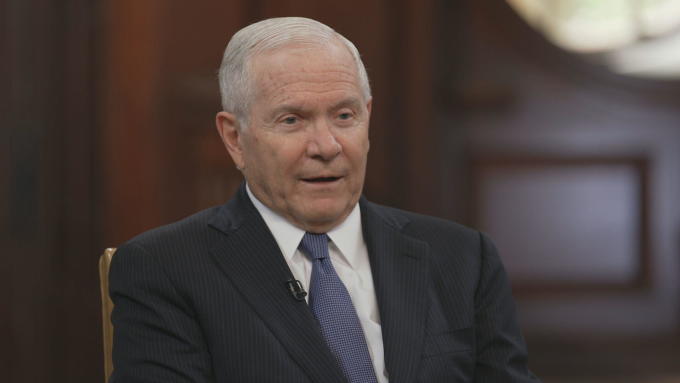 Former U.S. Secretary of Defense Robert Gates, who was appointed by President Bush and also served during the Obama administration, discussed a wide range of topics with Margaret Brennan on Sunday, including the war in Ukraine and several Nordic nations seeking NATO membership. What we asked: "President Biden is trying to usher in these two new NATO members, Sweden and Finland, into the alliance. That's a personal project for him. How strategically important is that?" What Gates said: "I think it's huge, Margaret. I think it changes the geopolitics in Europe in a dramatic way. If you go back to last fall and Putin's demands, one of those demands was to push NATO back to where they were in 1997. Well, instead of that, he's now got over 100,000 American troops in Europe, many of them in Poland, and on other front lines, and more NATO allies on those front lines. And now if Finland becomes a member, another 800-mile direct border between Russia and NATO, the whole purpose of moving them back to 1997 was to keep that East European buffer between NATO and Russia. Now he's got NATO on his doorstep, not only in Ukraine and elsewhere, he's going to have them on his border in Finland. And you know, it's an amazing thing he's done because he's gotten Sweden to abandon 200 years of neutrality...I think Putin, one of his many, huge miscalculations in invading Ukraine is he has dramatically changed the geostrategic posture of Western Europe. And now that you have the Swedes and the Finns as part of that, he's really put Russia in a much worse strategic position than it had before the invasion." Why it matters: NATO's 30 member countries are now reviewing the applications from Sweden and Finland. If their bids are accepted, the two once-neutral Nordic nations could become members within a few months. When the leaders of the two countries visited the White House last Thursday, Mr. Biden offered his "strong support" for their applications. 2. Director of Elections and Surveys Anthony Salvanto discusses new CBS News polling 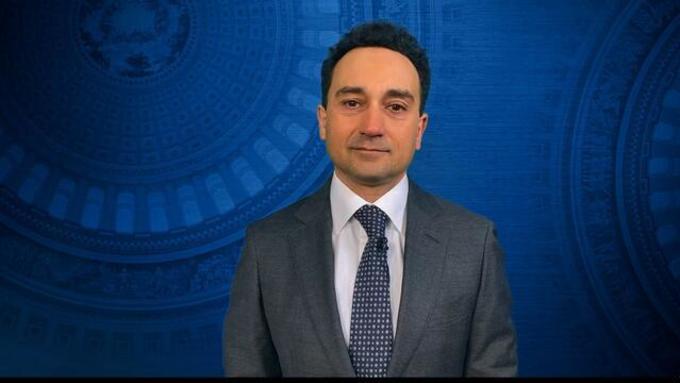 New CBS News polling released Sunday shows that the number of Americans who say things are going badly in the country is at the highest rate it's been since Mr. Biden arrived at the White House. Of those surveyed, 63% feel uneasy and worried about the state of the country. CBS News' Anthony Salvanto explains the polling. What we asked: "Is inflation still the number one electoral issue for Americans?" What Salvanto said: "So much of this is about inflation. That view of the nation that you described at the top is driven by concerns about inflation. So much of these views of the economy are driven by concerns about inflation. In fact, the number who say that the economy is bad is now the highest it's been during the Biden administration. And then recently, we see people reacting to the drop in the stock market where now they're pessimistic about both the market and maybe their retirement. So all of that is piling on. And the longer that it goes, you see people becoming more pessimistic that it can be reversed. Having said all that, Margaret, I do need to point out a couple of optimistic things. One is the jobs market. People are optimistic that they can find a job in their area. And then the other part is, you have to say, after two years of a pandemic and all the losses, people are starting to feel optimistic about that effort as we head into the summer." What we asked: "What about the parties themselves? Do Americans think they're talking enough about the issues that actually matter to them?" What Salvanto said: "In a word, no. You know, you're seeing the party primaries play out in state after state around the country now. And yes, the candidates are forced to speak to their bases in those places. But something that both Democrats and Republicans share is that they want those potential nominees to talk about inflation. And maybe by virtue of the fact that they're not talking about it enough, the parties are actually even on this, or Republicans don't have a large advantage on the interest inflation rate, even though the Democrats are the party in power. But after that, the bases really diverge. You have to point out the Democrats are very concerned about the potential overthrow of Roe v. Wade, and they want their candidates to talk about that and abortion rights. And then the Republicans are having this split. And it's really important as people watch this go forward over former President Trump. You've got half of Republicans who say they want their candidates to talk about being loyal to the former president. You've got nearly half who say that they want to basically relitigate 2020 and talk about what they feel was a rigged election, even though that's been disproven. So you've got the other half of the Republicans that don't want that, and that's an inter-party fight that you're seeing play out in race after race, state after state right now." Why it matters: Last week's midterm primaries helped set the direction for the Democratic and Republican parties, but most Americans aren't terribly happy with the parties or their messaging, CBS News polling shows. Voters described the Democratic Party as "weak," while a slight majority of voters described the Republican Party as "extreme." 3. Sen. Rick Scott: Biden's handling of inflation "bodes well for Republicans" 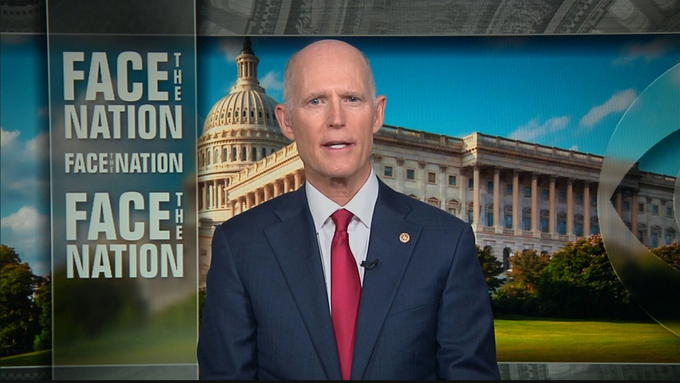 Sen. Rick Scott said he agrees with CBS News polling released Sunday, which shows inflation is the top issue for Americans right now. The GOP senator from Florida added that Mr. Biden is "slow to react" in addressing major issues. The November midterm elections will be about inflation and the effectiveness of the Biden administration, Scott said, which "bodes well for Republicans." What we asked: "You just heard our poll, which shows Republicans don't really have much of an advantage on that specific issue: 51% of those polled trust the GOP on inflation, 49% trust Democrats. How do you advise Republicans to change that?" What Scott said: "I think it's important that, you know, we talk about what we're going to do. And we explain the problem that the Biden administration has, that they don't react to, you know, record gas prices and open border, things like this. But also, we tell people what we're going to do to bring down inflation. We're going to balance the budget. We're going to start watching the dollars very closely. We're going to watch our spending. We are going to, you know, expect the Federal Reserve to reduce their balance sheet. So, I think we have to talk about the things that we're going to do to make it better for people. But if you go and look at the races around the country, Biden's numbers are really, really bad. And he is the face of the Democrat Party right now." Why it matters: Scott has released an "11-point plan to rescue America," in his role as the chair of the National Republican Senatorial Committee. The Institute on Taxation Economic Policy says Scott's plan would increase taxes by more than $1,000, on average, for the poorest 40% of Americans. Senate Minority Leader Mitch McConnell denounced the plan, saying, "we will not have as part of our agenda a bill that raises taxes on half the American people and sunsets Social Security and Medicare within five years."
4. New York Rep. Hakeem Jeffries on redistricting 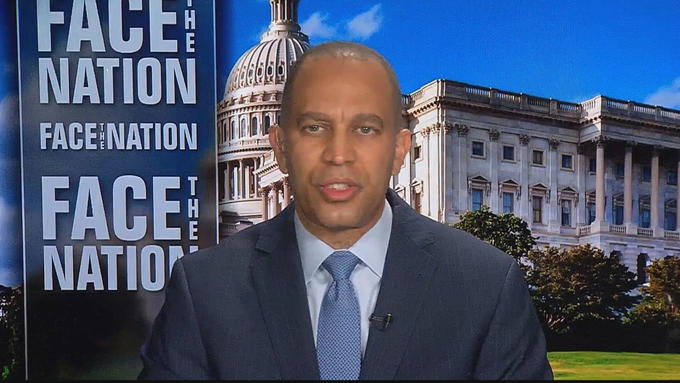 New York Rep. Hakeem Jeffries says he's "very confident" that Democrats will hold on to their majority in Congress in the midterm elections. A New York judge on Friday also finalized the state's new congressional maps, sending lawmakers and congressional candidates scrambling. What we asked: "I want to ask you a bit about what's happening in your home state of New York. We've talked on this program previously about the redistricting that has been happening around the country, New York, to Democrats advantage largely. But you've had this fight internally over the congressional map. Bottom line, did Democrats put their own communities at risk in your state by gerrymandering it to the degree they did?" What Jeffries said: "Well, the Court of Appeals was wrong in the decision that they made, both on the substance and in terms of turning over redistricting to an out-of-town unelected Special Master and a judicial overseer in Steuben County, who's a Republican-leaning partisan...The process, unfortunately, was hijacked by the Court of Appeals. A bad process has now led to a bad result. You're talking about five different congressional districts where the Black and Latino population was degraded. The only most significant Jewish district in the country has been detonated for no good reason." Why it matters: State Judge Patrick McAllister released the new maps just before the Saturday night deadline. It followed a chaotic week in New York politics after Jonathan Cervas, a special master appointed by the court, released a draft map that was less favorable to Democrats than the one drawn by the Democratic-controlled legislature. The state Supreme Court had appointed Cervas after throwing out those maps earlier this year. Cervas made a few changes in the final maps released late Friday, but the new maps have only 15 safe Democratic districts, three safe Republican districts and eight competitive districts. New York's current congressional delegation has 19 Democrats and eight Republicans, and the state is losing a seat due to the population loss in the 2020 census. 5. Economist Jason Furman: Anti-price gouging bills are "gimmicky" 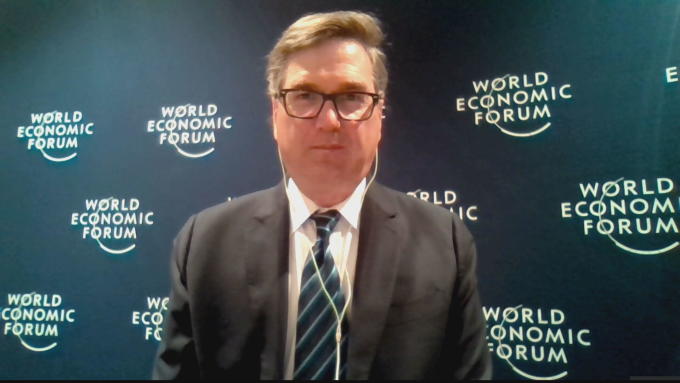 Jason Furman, an Aetna professor of the practice of economic policy at the Harvard Kennedy School, says he's not "super worried" about a recession over the next six months, but he believes there are other ways the Biden administration can tackle current U.S. inflation. Furman, who also served as an economic advisor under President Obama, says Mr. Biden should lift the trade tariffs on China as one tool to tackle rising costs. What we asked: "We talk and have been talking about inflation on this program. It is, of course, the job of the central bankers, the Fed, as you just referenced there, to act, to control it. But politically, there's a cost. As you know, Democrats are pushing bills in Congress, as Congressman Jeffries just talked about, trying to cap what they're calling price gouging. You hear President Biden using that phrase, also talking about raising taxes on the wealthy. As an economist, do any of those things have a measurable impact for consumers in fighting inflation?" What Furman said: "As you said, most of the job of fighting inflation is with the Fed. There's a little bit the president can do. He's done some good steps, whether it's opening up ports, getting more truckers on the road, releasing oil from the Strategic Petroleum Reserve. I'd like to see him do more like lower tariffs on China that were placed there by President Bush. I don't think, though, that these anti-price gouging bills would do much to bring inflation down. They just increase the type of shortages that consumers probably hate even more than the high prices." What we asked: "You were quoted as saying corporate greed is a bad theory of inflation. Is that another way of saying that what Democrats are talking about is just a gimmick?" What Furman said: "I think it's pretty gimmicky, these price gouging bills, because, you know, he's got a lot of extra demand. What happens when demand goes up? Prices go up. There's an old saying the cure for high prices is high prices. That's a little bit of a painful thing to deal with, but it's what elicits the additional supply. It brings more producers into the market, and it's what brings prices down and we need to let that process work. You try to interfere with it, you're going to make things worse. We tried that in the seventies, it was a big failure. We shouldn't be repeating it again." Why it matters: The House of Representatives passed a bill along party lines Thursday that seeks to lower gas prices by cracking down on alleged price gouging by energy companies. With no Republican lawmakers supporting the bill, it is likely to fail in the Senate. Some moderate Democrats were frustrated with the bill, arguing it did little to address the forces driving inflation, and instead could vilify oil and gas companies and result in less production. |
No comments:
Post a Comment